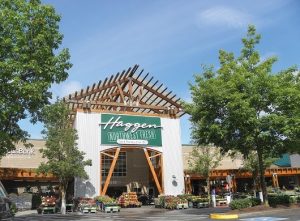Deal puts Haggen on fast grocery store track
IN THIS ARTICLE
- Latest news Topic
- Elijah Brumback Author
By Elijah Brumback Friday, January 2nd, 2015
Next time you head to your local grocery store, the name on the outside might be different, along with displays, but don’t expect too much to change.
Haggen, a grocery store chain out of the Pacific Northwest, is set to takeover 146 Albertsons and Safeway stores in California, Nevada and Arizona, 20 of which are located in the Tri-Counties.
The area stores Haggen is taking over are a small part of a larger antitrust deal between Albertsons and Safeway and the FTC that will allow the two company’s $9.2 billion merger.
When the deal is complete, Haggen will expand its operations by almost 10 times, increasing its number of employees by about 8,000 and boosting its annual sales volume from $4.2 million to nearly $3.7 billion.
“We’ve been very busy as a team for the 90 days, planning out all the critical paths from people to supply chain technology,” said Jim Clougher, CEO of Northwest operations for Haggen in a phone interview. “But together as a business we feel very confident in our execution with our necessary partners.”
The general plan, Clougher said, is to have as little disruption as possible through the transition, keeping relatively the same product mix and maintaining current services.
While Haggen wanted to grow, the expansion deal was put forward by the equity group that owns a majority stake in the grocer, Comvest Partners. Headquartered in West Palm Beach, Florida, Comvest claims its assets under management are valued at about $1.3 billion. The firm offers debt and equity capital to middle-market companies in various industries across the the U.S.
Scott Moses, managing director of Sagent Advisors, which advised Haggen and is majority owned by the private equity firm Comvest Partners, told Supermarket News the motivation behind the deal was to make Haggen more competitive. The company’s new position also sets it up to acquire more smaller grocers going forward.
“Looking at it broadly, the price was probably right for these stores,” said Jon Springer, retail editor of Supermarket News, which covers the industry nationally. “With private equity behind them, [Haggen is] getting all the scale they want, and there are some other guys picking over the leftovers.”
A total of 18 stores are also being sold to three other operators in different states.
“A lot of these cities where these stores are located, there isn’t really much organic growth in these built-out markets,” Springer said. “It looks like more of move to quickly get into new markets.”
From the perspective of Albertsons and Safeway, the deal was about making their merger work and not squeezing every dollar out of the stores, he said.
For Haggen, a big hurdle will be establishing its brand and community ties to the region, relying on stores’ current local management.
Another big undertaking will be renegotiating the collective bargaining agreements with the stores’ unionized employees. Clougher said a majority of the stores in the acquisition are unionized, and the company plans to work with those employees to honor those agreements.
According to a statement Haggen released when the acquisition was announced, all current Albertsons and Safeway employees will have the opportunity to continue working for Haggen in the changeover.
In an interview with Supermarket News, Bill Shaner, a former Save-A-Lot executive hired as CEO of Haggen’s new Pacific Southwest division said the stores the Bellingham, Washington-based chain is acquiring are solid financially and have room to improve under the Haggen brand.
“It’s a blend of stores, but a lot of them are terrific — very profitable, very successful, strong sales trends, great store teams,” Shaner told SN. “Like any fleet of stores, some are better than others, but at the end of the day what we were able to buy are stores that are healthy, profitable and frankly, we think under the Haggen brand, have the opportunity to do even better going forward.”
The company has also said it will be investing in renovations at each of the stores to fit the Haggen model starting this year. Clougher said the specific plans and budgets will be on a store-by-store basis.
“Haggen’s acquisition growth is another example of a decades-old regional grocer adding scale to combat an ever-rising tide of food retail competition from much larger, well-capitalized supercenters, club stores, natural-focused grocers, drugstores and dollar stores, as well as numerous online operators such as Amazon.com, Walmart.com, Target.com and Drugstore.com,” Moses told SN in an interview.
The company compares itself to grocers like Wegmans, Harris Teeter Supermarkets and Mariano’s, which is owned by Roundy’s Supermarkets.
“By growing scale and findings synergies within our company, we believe there is organic growth to gain and we plan to put a lot of energy into community building and partnering at local level,” Clougher said. “We’re already a grocery chain, so the inherent systems are all in place, but it just becomes about scaling it rather than creating it.”
The company has already established partnerships with two new distributors including Supervalu to support supply chain and back office operations. The company also plans to hire an additional 200 people in California, Nevada and Arizona to help with corporate marketing as well as local food manufacturing and buying.
“Over time we’ll probably start to see some optimization and more transition,” Supermarket News’ Springer said. “They’ve brought in some experience so its not coming out of nowhere, it’s a team that knows what they’re doing.”
Related Articles
 Sunday, October 30th, 2022
Sunday, October 30th, 2022
Real Estate: Thousand Oaks office manager pleads guilty to embezzlement; celebrity home sells in Carpinteria
 Thursday, October 20th, 2022
Thursday, October 20th, 2022










